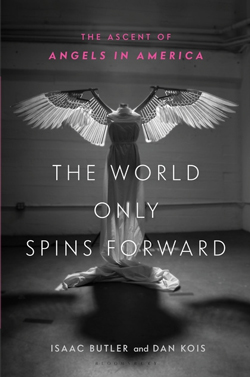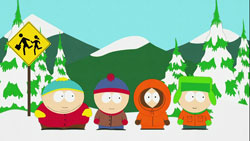The World Only Spins Forward: The Ascent of Angels in America was released on Feb. 13, and is just as sprawling and emotional as the play it focuses on.
Described as an ‘oral history’ of Angels in America, which will be opening on Broadway on March 25 after transferring from the National Theatre in London, it tells the story of the show’s inspiration, creation, and production, as well as describing the societal, historical, and cultural contexts at the time of the show’s creation and following productions.
Co-authored by Isaac Butler and Dan Kois, the book includes stories from playwright Tony Kushner, members of various productions – including the upcoming Broadway production, the original production, and several different versions in between.
Arranged chronologically, it shows how a play can be in flux and constantly be being changed, even though it was first produced 25 years ago.
Described as “a play that redefined what theatre could be” by the Washington Post, Angels in America tells the story of six characters, including President Donald Trump’s former mentor Roy Cohn, during the AIDS epidemic. Throughout The World Only Spins Forward, different actors describe their take on and portrayal of the characters, explaining why they chose to interpret the roles in certain ways.
Also included is commentary from reviewers and journalists who covered the AIDS epidemic, remarking on the evolution and importance of the play.
While the AIDS epidemic was originally raging, the mainstream media did not pay it much attention, as society dismissed it as something that only happened to gay men, and according to some of the journalists cited in the book, Angels in America entering the cultural landscape meant that people were forced to acknowledge and confront the reality of the illness.
The two-part play lasts nearly seven hours – something that was constantly mentioned by cast members in the book, especially as they discussed the intricacy of staging and rehearsing the production.
The first part of the play, Millenium Approaches, was written years before the second part, Perestroika, and in the first half of The World Only Spins Forward Kushner details the long, arduous process behind writing and re-writing Perestroika, finally finishing it within two weeks in a secluded cabin.
The World Only Spins Forward is full of information like this – snippets of stories that are so far behind-the-scenes that even the cast members involved with the show don’t know about them. While many of the stories are humorous in nature, there are also stories of frustration with the play and the direction of it; some directors talk about working with Kushner as if it were a nightmare experience.
Also mixed in are tragic stories, fitting for a play of such weight.
The play is set during the AIDS epidemic, and it was written at the same time, so it is only sensible that that epidemic is addressed often by the cast and creative team members, especially from earlier productions.
While most of the stories are larger in scope and scale, addressing the epidemic as it affected the world around them, some have specific stories of friends lost or their own close calls with the illness.
Two stories which are particularly affecting have nothing to do with AIDS. One is that of Kimberly Flynn, a friend of Kushner’s who was described by Kushner and several other friends as being brilliant and genuine.
However, in 1984, before Angels in America was produced, she was involved in a serious car crash that left her with cognitive defects and difficulty with speaking, reading, and remembering.
When Kushner speaks about her and her injuries, his sadness is palpable. Later, she did recover enough to become the production dramaturg for Angels, but the early pages of The World Only Spins Forward and the early stages of Angels in America were heavily touched by her injury.
Another story that affected the production of Angels severely was that of Sigrid Wurschmidt, who played the Angel in the original version of the show.
According to Kushner, each character was written to suit his actor friends, and the Angel had been specifically tailored to fit Wurschmidt’s acting talents and personality.
However, she was diagnosed with cancer not that long after, and was unable to do the production before her eventual death, meaning that the role was passed on to her best friend, Ellen McLaughlin, who played the role in every United States production from its early workshops to its Broadway run.
While Angels in America has always been a personal and heavy production, it’s stories like this, and hundreds of other tales within the pages of The World Only Spins Forward, that really drive the point home.
The book also includes behind-the-scenes photos of the cast and creative team and snippets of the script, which only add to a reader’s understanding of the topic.
Considered one of the most important plays in the American canon, The World Only Spins Forward only increases a reader’s excitement for the upcoming production of “Angels.”
Anyone interested in theatre history, LGBTQ+ history, or just generally fascinating stories would be well-benefited by reading this book, especially if they are planning to see Angels in America when it arrives on Broadway.
IMAGE TAKEN from Bloomsbury Publishing




